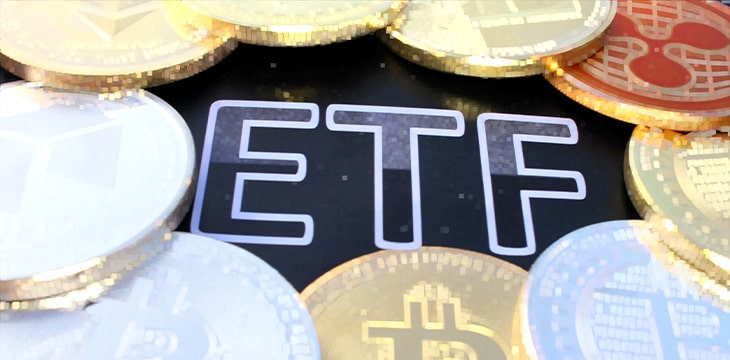Introduction
Cryptocurrencies or crypto assets are highly volatile, thus portending significant risks to investors. In order to de-risk investments in cryptocurrencies or crypto assets, a special investment fund can be created to remove or minimize the risk associated with the cryptocurrency or crypto asset. This investment fund can also remove or minimize the risk associated with unregulated cryptocurrencies or crypto assets. This is the idea of a cryptocurrency exchange-traded fund (ETF). While ETFs are already available for various assets ranging from commodities to currencies and for various industries, cryptocurrency ETFs are not currently common.
What is an exchange-traded fund (ETF)?
An ETF is an investment fund that tracks the price of an underlying asset. In traditional ETFs, shares from assets such as stocks or commodities are sold to investors by the fund provider who owns, manages, and tracks such assets.
Similarly, a cryptocurrency ETF enables a fund provider who owns, manages, and tracks cryptocurrency or crypto asset such as bitcoin or Ethereum for example to sell shares from the assets to investors. The fund provider owns the underlying assets of the investment fund.
Essentially with a cryptocurrency ETF both retail and institutional investors would be able to trade the price of the underlying asset. This underlying asset would be a cryptocurrency or crypto asset such as bitcoin, Ethereum, or Ripple for example. This trading takes place, not on a cryptocurrency exchange such as Binance, Coinbase, Huobi etc; but on a traditional stock exchange such as the New York Stock Exchange (NYSE), NASDAQ, London Stock Exchange (LSE), Tokyo Stock Exchange (TSE), etc.
That said, a cryptocurrency ETF such as a bitcoin ETF for example does not mean that the ETF would only comprise bitcoin as the underlying asset. A bitcoin ETF, apart from bitcoin, could also include stocks and commodities. This is partly why ETFs are considered less risky because ETFs provide investors with the advantage of diversifying their portfolio, thus mitigating risks.
With a cryptocurrency ETF, investors are able to enjoy access to a diversified portfolio of cryptocurrencies or crypto assets without having to own these cryptocurrencies or crypto assets. Ownership is limited to shares in the investment fund. It does not extend to the underlying assets themselves.
Advantages of a cryptocurrency ETF
- Simplicity and Convenience: Investing in a cryptocurrency ETF provides the benefit of gaining from the price of a cryptocurrency or crypto asset without exposing oneself to the avoidable risks involved in directly owning a cryptocurrency. Cryptocurrency ETF investors will not need to learn about blockchain technology and how it works, create and manage crypto wallets, involve in crypto trading, etc.
- Investor Confidence: Since trading in a cryptocurrency ETF would be taking place on traditional exchanges such as NYSE, NASDAQ, LSE, etc; the trading activity will be regulated by the relevant regulator(s). Such a regulatory environment tends to give investors—particularly institutional investors—the confidence they typically need to participate in such an investment fund. This is in sharp contrast to the unregulated world of cryptocurrencies or crypto assets where there are typically no centralized authority or accounting person. For instance, a good number of cryptocurrencies are still vulnerable to manipulation by investors with large holdings.
- Diversification: Due to the high volatility of cryptocurrencies, solely investing in cryptocurrencies without the benefit of portfolio diversification that an ETF provides would generally be considered a high-risk investment. As mentioned earlier, one of the benefits of an ETF is that it enables investors diversify their investment portfolio. So if the cryptocurrency ETF is an Ethereum ETF for example, the ETF could include Tesla stocks and other stocks.
Disadvantages of a cryptocurrency ETF
- No cryptocurrency ownership: An investor in a cryptocurrency ETF does not own any cryptocurrency, but shares provided and managed by the fund manager.
- Limited cryptocurrency trading: Owning shares in a cryptocurrency ETF where bitcoin is the underlying asset for example does not entitle the investor to trade the bitcoin for other cryptocurrencies such as BNB, Ethereum, Litecoin, Solana, XRP, and others. The reason should be obvious: Investors in an ETF hold shares in an investment fund that tracks the price of the underlying asset, not the underlying asset itself.
- Lack of maximum gain from price appreciation: As mentioned earlier, that an ETF is a bitcoin ETF does not mean that bitcoin is the only underlying asset comprised in the bitcoin ETF. The same bitcoin ETF can also have multiple stocks and commodities. So a cryptocurrency ETF will not provide an investor with the maximum gains when the price of the underlying asset (bitcoin for example) appreciates in price. This is because although a cryptocurrency ETF tracks the price of the underlying asset (bitcoin for example), this cryptocurrency ETF can also comprise multiple stocks or commodities in order to diversify the investment portfolio. In effect a 25% rise in bitcoin price does not necessarily result in a 25% rise in the value of the ETF.
- Absence of privacy: By investing in cryptocurrency ETFs, there is way limited privacy compared to one investing in cryptocurrencies directly through a decentralized cryptocurrency exchange with no central authority or intermediary.
- Presence of intermediaries: While the central idea of cryptocurrency is to remove middlemen or third parties by disintermediating transactions, a cryptocurrency ETF has a fund manager as the intermediary. And since ETFs are managed by a fund manager, investors in an ETF will be required to pay management fees to these fund managers according to the amount of shares such investors have in the ETF.
Depending on who the investor is or the philosophy of an investor, the presence or otherwise of government regulation may be either considered an advantage or a disadvantage. Most cryptocurrencies have self-governing and self-regulatory mechanisms built into them by means of various consensus mechanisms as well as smart contracts. But a cryptocurrency ETF would be regulated by the government.
Rounding off
Although cryptocurrencies or crypto assets are powered by blockchain which has been described as a trustless technology invented to solve the problem of trust in transactions, cryptocurrencies themselves are yet to gain trust amongst governments, law enforcements, and regulators. This has particularly slowed down the mainstream adoption of cryptocurrencies or crypto assets over the years. A cryptocurrency ETF will help to take digital assets mainstream, helping it leverage traditional investment infrastructure.
While there are currently a few cryptocurrency ETFs in some parts of Europe and more recently Canada, there has been none in the U.S due to the position of the U.S. Securities and Exchange Commission (U.S. SEC). But that changed in October 2021 when the first Bitcoin ETF was given tacit approval by the U.S. SEC on 15 October 2021. Although this Bitcoin ETF will be bitcoin futures and not spots, it is still expected that the approved Bitcoin ETF in the U.S. will open the floodgate of cryptocurrency ETFs in the U.S.
Discover more from Crypto Asset Buyer
Subscribe to get the latest posts sent to your email.





1 Comment
Comments are closed.